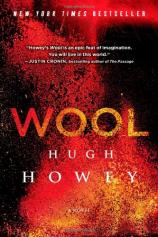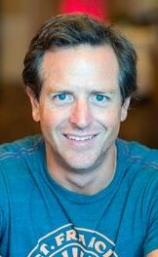Author Talk: March 22, 2013
Hugh Howey’s first novel, WOOL, is a post-apocalyptic sci-fi adventure that originated as a self-published short story on the Web. Fans quickly spread the word, which led to four additional installments of the tale and eBook sales of over 400,000. The highly-anticipated print edition, which is available in both hardcover and paperback, is now in stores. In this interview, Howey explains where the idea for the story came from and the advantages of breaking the narrative down into several shorter pieces. He also talks about the two drastically disparate views of human nature that the book presents, along with his upcoming projects, which include two more books in this current series.
Question: Where did the idea for WOOL come from? Which element presented itself to you first?
Hugh Howey: WOOL began with a question: Can we know the world by viewing it through a screen, or do we need to go out and see it for ourselves? From my reading of history, the world seems to improve for most people year after year. Our freedoms expand; our values improve; we become less cruel to one another. Serious studies by Steven Pinker and Jared Diamond in the last few years came to the same conclusion. But you would never think this to watch the news. Our perception of progress is colored through a very dark lens. When you go out in the world, you often find it to be a much better place.
Q: Instead of one continuous narrative, WOOL is broken into several shorter pieces. What was the intention behind this format? What were some of the advantages of writing this way?
HH: WOOL began as a short story. When readers began begging for more, I decided to follow the structure that was already working, which meant shorter works released more rapidly. There were advantages and challenges. The ability to switch points of view and tone gave me a lot of freedom to tell each story in the most natural manner possible. The challenge was to craft the plot in advance so that the second book could foreshadow the fifth. I released them as I wrote them, which doesn’t provide the opportunity to go back and edit what is already out there.
Q: One of the most satisfying parts of reading WOOL is catching the little bits and pieces that tip you off to something fundamentally different about how this society operates. As an author, how do you balance these subtle reminders of the wholly different nature of the world we’re reading about and the need to rely on some of them to propel the story? For example, the treatment of birth control?
HH: It’s certainly a balancing act. It would be unlikely for a character to marvel at the world they are perfectly used to in order to allow the reader a complete understanding. The challenge is to reveal pieces in an organic and believable manner. I largely rely on my wife reading early drafts. When she looks at me with one eyebrow raised and another lowered, that’s when I know I still have work to do.
Q: Science fiction is a genre that is frequently slighted in favor of more realistic or literary fiction. Does this bother you? Do you see a significant difference between sci-fi and “normal” fiction?
HH: It only bothers me in the sense of loss to readers. The genre is full of brilliant themes and soaring prose. What I noticed as a bookseller was that we tend to pluck the shining best out of science fiction and shelve them among general fiction --- Margaret Atwood, Cormac McCarthy, Michael Crichton, Stephen King, David Mitchell, Jonathan Swift, Mary Shelley. When we take the best of genre fiction and remove it from the genre, I believe we beg the question we are trying to pose.
Q: Juliette and Mayor Jahns are such memorable, strong and different heroines. Are they based on people from your life? Do you see yourself more as a Jahns or a Juliette?
HH: I’m surrounded by strong women whom I admire. My wife, mother, and sister are all amazing people. They each combine Juliette’s cunning and bravery with Jahns’s wisdom and compassion. I’m not sure I live up to either of these ideals. Perhaps my Juliette days are behind me and my Jahns days are ahead. At least, I hope they are.
Q: Many of the characters, Juliette and Walker especially, have a deep appreciation for mechanics, machines, and tinkering. Are you a tinkerer yourself? Do you have this kind of respect for machines?
HH: I’m a hopeless tinkerer! My problem is that I’ll tinker with something that is operating perfectly. I believe my true appreciation for machines and our reliance on them came from my years as a yacht captain. Finding myself away from shore and needing to repair a critical system, I learned the art of scavenging parts from something else, making decisions on what was necessary and what could be done without. I also learned the value of preventative maintenance, so these systems wouldn’t break down at all.
Q: Wool presents two drastically disparate views of human nature. Juliette espouses a more optimistic and open viewpoint towards the end of the book (p. 531-532) yet Bernard expresses a much darker, pessimistic view similar to the principles encoded in the Order. Can you explain a bit of your perspective on these differing viewpoints? Is the survival of the Silos over hundreds of years proof that the Order, dark as it is, is the more realistic take?
HH: I believe Bernard and Juliette represent a very real schism in the world. It’s similar to the classic Hobbes/Rousseau debate. By the end of the book, I believe it’s Lukas who possesses the right mix of optimism and caution. His experience in the server room combined with Juliette’s voice leaking through a headset gives him a mixed perspective.
My own view is that a free and truthful life is the only one worth living, even if that were to mean a truncated life. Keeping people “safe” by penning them up and restricting their freedoms is a sort of safety I abhor. My parents allowed us to take chances and swing from great heights, and the scrapes and scars I have from my youth were worth the risks.
Q: Post-apocalyptic literature is one of the hallmarks of science fiction, and seems especially popular now. What initially drew you to this kind of story? What did you like about working with that premise?
HH: I love tension in the stories I read and write. The beauty (or horror, as it were) of post-apocalyptic fiction is that the entire world is endangered. All of humanity hangs in the balance. So it isn’t just the protagonists we’re rooting for, it’s the legacy of mankind.
To my mind, the only thing that makes our mortality bearable is the belief that we’ll be survived by our children, our friends, our family. Perhaps the fascination with this genre is the terror that even this will ultimately be taken from us, that not a one of us will survive past some date. That’s difficult to bear as a reader, and yet fun to explore as a writer.
Q: So much of the mysteries of the Silo are revealed through the characters themselves, and their interactions with each other. Was this an intentional technique? Is it challenging to orient your readers and parcel out an understanding of what’s going on?
HH: It was absolutely intentional. I’ve never been a fan of telling the reader everything they need to know at once. I’d much rather tell the story through characters who are not privy to the truth of their circumstances and then watch them slowly peel back the layers. The true challenge is to provide clues in a way that the reader sometimes figures it out on their own and has that satisfaction. And then you mix this up with shockers they didn’t see coming, and that often makes for an enjoyable read.
Q: What’s next from Hugh Howey? How many more stories can we expect from you of the world of WOOL? Are you planning something new for when you’ve finished the story of the Silos?
HH: There are two more books after WOOL. Up next is SHIFT, which is a shift in perspective and pace. It tells the story of those behind the Silo project, but it also intersects with the events portrayed in Wool. Wrapping up the series will be DUST, where these two narratives collide.
I have a ton of stories I want to tackle once this saga is complete. If you are a reader, you know the incredible thrill of finishing a good book and being able to choose the next. That’s how I feel as a writer. I have a half dozen outlines and works already begun. I’ll sit down and sort through them and see which one I want to tackle.




